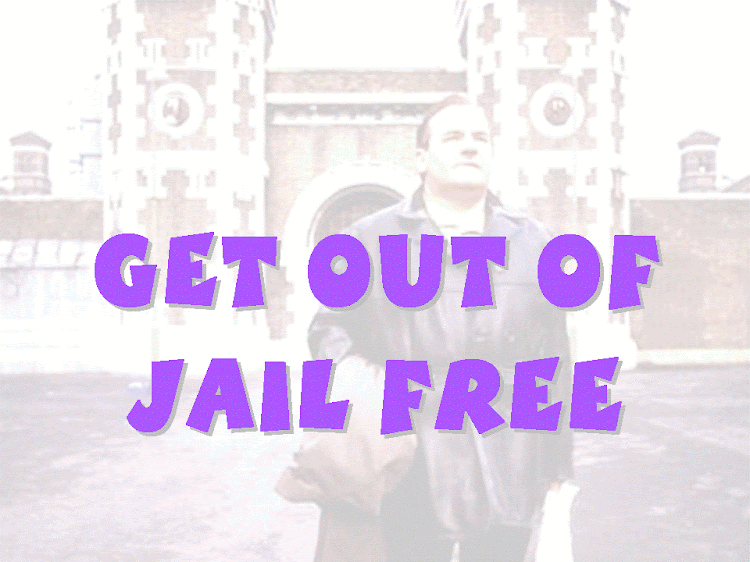I appreciate, and respect (of course) that not all who read this blog are adherents of the Christian faith. So you can let your eyes glaze over here if you want and watch this instead, which I saw on TOTP2 today, and which has nothing to do with this subject, but is beautiful, even to an ageing rocker like me.
 To go back to the matter in hand, this is something I've thought more about since I began as a prison chaplain than in my former life in "regular" church (haha - they're all irregular in my experience).
To go back to the matter in hand, this is something I've thought more about since I began as a prison chaplain than in my former life in "regular" church (haha - they're all irregular in my experience).Prisoners can be dramatically converted and this is, in my opinion, an amazing and wonderful thing. Of course it is. And I believe in it. With all my heart. Yes, I know that prisoners have been known in the past to fake their conversion to aid their parole chances, but society's view of religion has changed so much that (certainly in this country) this is unlikely to work and isn't tried much if at all now. Besides which, it's a pretty difficult thing to pull off, and chaplains and other prisoners can usually see through it. But when a guy genuinely is dramatically converted, it is indeed a miracle worth the celebrating. Him Indoors had a dramatic conversion himself, in 1986, although not in jail thankfully. He lived in a village and was the hot topic of conversation for some time as he was a "weel kent face". People kept expecting this mad phase to wear off but, now that he has been a minister for eleven years they have forgotten he ever was anything else.
And yet, dramatic though it was in some ways, it wasn't as sudden as all that. There were things that led to it, and there was intense teaching for him after it. Really it was the crucial step in a very long process which is still ongoing.
Tom, my US chaplain cyber-friend, is talking about people who want to come into the jail with an evangelistic campaign to preach prisoners to the point of decision, whereby they will pray the "sinner's prayer". The sinner's prayer is something along these lines:
"God, I know that I am a sinner. I know that I deserve the consequences of my sin. However, I am trusting in Jesus Christ as my Saviour. I believe that His death and resurrection provided for my forgiveness. I trust in Jesus and Jesus alone as my personal Lord and Saviour. Thank you Lord, for saving me and forgiving me! Amen!"
I am a fan of the sinner's prayer. It covers the basics and if it's prayed in faith can be the moment from which time forward a goat becomes a sheep, a person becomes the adopted child of God, a person's citizenship legally and literally (though not in the state's eyes!) changes to "citizen of heaven" and so on (there are many Bible images). I believe that and I've seen the reality of it.
However it's not magic words like "Abracadabra", "Alekazam", "Izzy Wizzy Let's Get Busy" (the Sooty show), "Spout, handle, lid of metal, what's inside the Singing Kettle" (if you don't know, I couldn't explain it). Saying the sinner's prayer, on it's own, isn't enough, especially, I would venture to say, in prison.
Guys who've never been to church in their lives, who missed lots of school, who know literally nothing about what being a Christian means, and whose life is messy and complicated, with dysfunctional relationship issues, anger issues, addictions issues, victim issues, old associates issues, you-name-it issues, need lots of support and guidance and nurture.
The hit-and-run evangelist may just make things worse. Certain types of offender, and I won't say which, are particularly prone to latch onto the "God forgave my sin" thing to let go of the past TOO easily and leave them conscience free when they haven't yet begun to feel the guilt that they should if they were to take full responsibility.
That's not to say that evangelists are Bad Things (well some are - I see them on some of the God channels and I reckon they should be in the jail, as prisoners). But Good Evangelists do have the gift of closing the deal as God's salesmen and I acknowledge that I've just not got that gift at all. Sometimes I'll invite in a speaker with that gift to help with that stage, but I'll need them to grasp that a stage is what it is.
 Him Indoors has been in the home of Billy Graham and is a real fan. I am too. But Billy Graham would be the first to tell you that when he spoke at all those big rallies, of those who went forward at the end, and who made a "decision" which proved to be a lasting one, a HUGE majority were people who had been the subject of the prayers of at least one friend for a long time, and who were well nurtured thereafter.
Him Indoors has been in the home of Billy Graham and is a real fan. I am too. But Billy Graham would be the first to tell you that when he spoke at all those big rallies, of those who went forward at the end, and who made a "decision" which proved to be a lasting one, a HUGE majority were people who had been the subject of the prayers of at least one friend for a long time, and who were well nurtured thereafter.Half the New Testament contains letters form Paul the Christian leader to new Christians, teaching them, nurturing them, loving them, praying for them, and PARENTING them.
Today I saw two of my fellow chaplains in another jail doing that with the prisoners there, in it for the long haul. The evidence was there for me to see that they've already been doing that, and it was moving. Very moving. And hopefully the effects will last and last.











5 comments:
As a soon to be former fellow Chaplain in prison work, I share your issues about Hit and Run evangelism. I believe that long term followup is absolutely necessary after a conversion experience. This is true in any setting, but I believe particularly critical in prison.
Amen, amen, amen. Actually, I think this is just as true of people outside prison. I just don't think hit and run evangelism can work unless there is a way to get the person solidly grounded and nurtured, and that best happens through relationship.
Good post Anne. Like you, I too am a fan of the sinners prayer. And yet in the context of working with children there is so much more to take account of when considering the stages of faith development (I have blogged about this so much cyberpeople are probably fed up hearing from me! Give her a glass of wine and sit her in the corner they may say!)
Bit Westerhoff's stages weren't written about children; they take account of the stages of faith development which are inextricably linked in to cognitive development and external stimuli. We know that many of the guys in jail have not had the same life chances that others have and as a former secondary teacher I would reckon that some of those inside have learning difficulties or additional support needs of some sort.
And so a quick "WHAM BAM you're saved" without nurture - the same nurture flowing out from us through the "its all rosy" experiential stage shown to the prisoner struggling through to the questioning phase is essential.
For me that word "nurture" is vital.
Thank you. You've captured perfectly what I was trying to convey.
This really echoes my stance on hit and run. Thanks.
Post a Comment